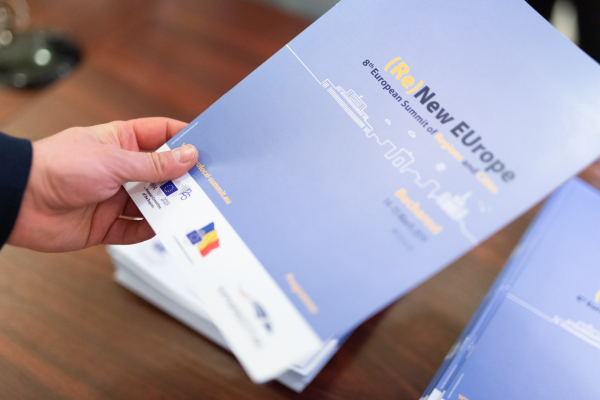Bucharest Summit of Regions and Cities

The theme of the 8th edition of the European Summit of Regions and Cities was “Renew Europe”. The Summit is organised once every two years. This edition took place in Bucharest, Romania and was co-organised by the European Committee of the Regions, the Romanian Presidency of the Council of the European Union, and the Romanian delegation at the CoR. During the event, a declaration by local and regional leaders on the future of Europe was adopted in order to share their voice ahead of the European elections and the next term of office of the EU institutions.
The Summit brought together EU, national, local and regional leaders from across Europe to discuss the future of the European Union and how to involve the citizens more effectively in the European project through local and regional authorities.
A delegation of young elected politicians (those 40 and under) were invited to the Summit. From the ECR affiliated political parties, 10 young politicians were present. ECR Group Maurice Golden MSP (Member of the Scottish Parliament), as a young CoR politician, spoke at the panel organised for the young elected politicians underlining the importance of using social media as effective tools for reaching the youth. On the subject of female engagement, Maurice Golden also said that women as politicians are targeted more heavily for abuse on social media. He underlined that all politicians and political parties need to take responsibility in stopping their members and followers from targeting women.
Two ECR Members spoke on the panel on the future of the EU’s Cohesion Policy –Juraj Droba (President of the Bratislava Region in Slovakia) and Pavel Branda (Vice-President of the Association European of Border Regions and Deputy Mayor of Radlo municipality in the Czech Republic). The importance of reforming the EU’s Cohesion Policy was underlined noting the challenge of the current statistical system used by the EU under which social and infrastructural parameters are not taken into account. “As Bratislava, we are the 8th most developed region in the EU according to Eurostat but in the social progress index we rank 181 out of 272 European regions”, explained Mr Droba. The added-value of people- to-people projects in cross-border areas given that approximately one third of EU citizens live in them was underlined by Mr Pavel Branda, who is the spokesperson of the European Committee of the Regions on this issue.
ECR Members who took the floor in the different debates at the Summit included Mr Włdysłw Ortyl (Marshal of the Podkarpackie Region of Poland), who took the floor in the debate on strengthening European democracy. He underlined the importance of taking a stronger bottom-up approach to policies such as the EU’s Cohesion Policy. He noted that “EU’s Cohesion Policy gives a lot of influence to local communities. But in order to fully untap its potential, it needs to be customised, involve cross-border & interregional cooperation and be supported by new macro-regional strategies.
Daiva Matoniene took the floor in the debate on building a sustainable future. She underlined the importance of coupling ambition in climate action with realism in terms of what is possible at a local and regional level underlining the need for territorial impact assessments. Tadeusz Andrzejewski (Member of Vilnius district Municipal Council) took the floor in the debate on social cohesion and integration in regions and cities highlighting also the importance of focusing on social cohesion in countries of origin to address some of the root causes of why people were leaving their countries of origin. Roberto Ciambetti (President of the Veneto Regional Council in Italy) took the floor in the debate on active subsidiarity underlining the importance of the EU involving regional parliaments with legislative powers in its decision-making process.

